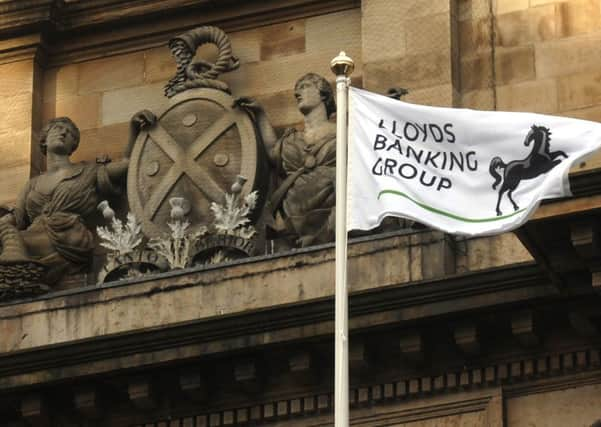Jeff Salway: Lloyds a fine prospect depite payout


The public sale of Lloyds shares has been tipped to prove popular even after the bank was hit with a record fine yesterday, with demand set to be driven by investors in search of income.
The government confirmed this week that it is to press ahead with a sale of around £9 billion of Lloyds shares to ordinary “retail” investors over the coming year, as it further reduces the taxpayer share in the bank.
Advertisement
Hide AdAdvertisement
Hide AdThe government now owns just 18.99 per cent of Lloyds, having been gradually disposing of holdings through institutional investors since last December.
The government is to publish further details of the sale over the coming weeks, while the chancellor will next week set out plans for a public sale of Royal Bank of Scotland shares.
But news of the Lloyds sale has been overshadowed by the record £117 million fine slapped on it for serious failings in its handling of PPI complaints. The Financial Conduct Authority (FCA) accused Lloyds of using the “overriding principle” that its processes were robust and that the complainant was wrong, even when it knew there had been significant mis-selling.
Georgina Philippou, of the FCA said: “Customers who had already been treated unfairly once by being mis-sold PPI were treated unfairly a second time and denied the redress they were owed. Lloyds’ conduct was unacceptable.”
But the fine isn’t likely to damage the investment case for the bank, experts say, not least because further PPI setbacks were to some extent already priced into the value of its shares.
The Conservative pre-election pledge suggested investors would be able to apply for between £250 and £10,000 of shares, with a bonus of one additional share for every ten if they were kept for at least a year. There’s also been speculation that the shares could be sold at a discount to their market price.
Many ordinary savers and investors will already own Lloyds shares through funds held in their pension and Isa wrappers, pointed out Gordon Forbes, managing director at Caledonia Asset Management.
“With the government gradually selling shares to institutional investors until the end of this year these may increase, particularly within income producing funds which were not able to hold them over the period where dividends ceased,” he said.
Advertisement
Hide AdAdvertisement
Hide AdLike many banking stocks, Lloyds might prove particularly popular with investors looking for a regular income.
“Lloyds has worked hard to get back to profit, and payment of the first dividend since the crisis provided confirmation from the Prudential Regulation Authority that Lloyds’ liquidity was sufficiently healthy for it to be allowed to resume paying out cash to shareholders,” said Forbes. “That said, the spectre of on-going PPI pay-outs, regulatory fines and further necessary restructuring may keep share value and dividends relatively low for some years.”
A dividend per share of 2.5p is feasible this year, rising to 4p in 2016 and possibly 5p in 2016, suggested William Forsyth, principal at Charlotte Square Investment Managers.
“Gradually the market will look to the attractions of Lloyds as an income stock again,” he said. “The government would like to dispose of the balance of their holding by the New Year and the prospect of a 5 per cent discount and perhaps a 1 for 10 loyalty bonus if held for a year would likely tempt the retail public.”
RBS shares are set for a public sale too, despite concerns that the bank remains some way from returning to health. Yet that factor could make it more appealing, according to Forsyth.
“RBS is more of a buy despite likely posting yet another consecutive loss, stretching back seven years,” he said. “The argument here is not about profits or dividends at the moment, but more from their reduction of activity in corporate banking and disposal activity in the US, which will boost their capital for regulatory banking purposes well above minimum levels and above their competitors.”
But anyone considering buying shares as part of either offer should ensure the investment fits in with their needs and circumstances, given the risk involved.
“It’s important to consider your own situation, existing portfolio and capacity to bear losses as well as gains in future, rather than being tempted by a cut price offer from a government,” said Forbes.
Advertisement
Hide AdAdvertisement
Hide Ad“Many consider that Lloyds shares have been undervalued in recent years and there may well be an initial uplift in value at a public offering, particularly if the suggested discount is applied, but the share price may dip once that discount has ‘worked through’ and future growth will most likely be slow.”